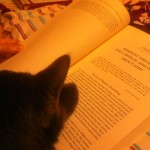
Content Note: Descriptions of Abuse, Abuse Apologism
Ever since we started dating, my husband Abe has been trying to talk me into watching the movie Fireproof with him. No, not because he thought it would help our relationship, but because he insisted that it was one of the funniest movies I’d ever see. A couple of weeks ago, we finally rented the DVD at Family Video (yes, those still exist), and he was right. It was pretty hilarious–in the same way that Troll 2 and Jaws The Revenge are hilarious. It was awful.
Even though Abe and I found ourselves laughing throughout the entire movie, there were a few scenes that forced me to stop and think, “Wait, people actually take this seriously.” As funny as the cheesy lines and awful acting are, the messages this movie sends are dangerous.
I’ve also been reading through the Christian marriage book Love and Respect. I’d meant to include this book in my “You Are Not Your Own” project, but my professor suggested I drop a book or two from my list as it would be too much work to complete in just a few months, and that was the one to go. A conversation on Facebook promoted me to pick it up and read through it.
I don’t know this for sure, but I would not be surprised if the movie Fireproof was created by a huge Love and Respect fan. Both contain the same harmful messages.
What are these harmful messages?
The central message in Love and Respect is that men need unconditional respect, and women need unconditional love. When heterosexual husbands (there are no other types of husbands in this movies/books) do not get respect from their wives, they react unlovingly, which causes wives to respect them even less, which causes husbands to love their wives even less, and the cycle goes on and on. To break the cycle, one spouse must decide to either love or respect the other unconditionally, no matter what the risk.
In the movie Fireproof, we see this cycle that Love and Respect talks about. The idea of men needing respect is presented from the beginning, when Caleb (Kirk Cameron) is talking to his friend and says, “How is it that I get respect everywhere I go, except in my own house?”
Later, Caleb goes home and gets into a fight his wife Catherine (Erin Bethea). He starts screaming at her, and backs her into a wall yelling, “Shut up! I’m sick of you! You disrespectful, ungrateful, selfish woman! You constantly nag me and you drain the life out of me. If you can’t give me the respect I deserve [she turns away]–Look at me!–then what’s the point of this marriage?”
After the fight, he goes outside and throws the trash can against the wall in anger. Later, when his wife turns down his romantic advances, he takes out his anger at her on this same trash can using a baseball bat.
Remember, Caleb is the protagonist here. We learn later that the movie wants to show his tactics as wrong (the screaming and shouting–the movie is less clear on his destruction of family property as a response to anger, as he destroys the family computer when he gets a pop-up for pornography and we’re meant to see that act as honorable). But even as he is screaming and shouting at his wife, we’re supposed to empathize with his manly man need for respect. He is never told to give up on his desire for respect from his wife, but is told to draw respect (Respect here seems to mean the honoring of male “headship/leadership,” as it does in Love and Respect) out in a benevolent way, by treating his wife with love.
Though Fireproof focuses mainly on husbands, telling them if they want respect from their wives, they should draw it out with benevolent sexism love, Love and Respect puts more responsibility on women. Love and Respect asserts that all men need respect, and that godly wives give their husbands respect whether their husbands deserve it or not. The author says he understands why women might be afraid to do that, acknowledging that some husbands are abusive, but he believes that if wives respect their husbands, it will convince even abusers to love.
Love and Respect gives one example of a husband who throws a dish at his wife, cutting her face open. The husband spent a few days in jail for this, but the wife’s response to this situation was to contact Dr. Emerson Eggerichs (the author of Love and Respect) for materials “about unconditionally respecting her husband.” She told Eggerichs that she was “mightily convicted about my need for learning this vital aspect of my wifely role.”
Neither the wife who took a dish to the face nor Catherine from Fireproof are given the option for leaving their abusers. The movie Fireproof shows Catherine talking to her friends. These friends are portrayed as catty, gossipy, worldly (and, not surprisingly, half of her friends are black women–the only significant black women in the movie), and they offer Catherine a place to stay should she choose to leave her husband.
We’re supposed to see them as bad friends. For offering her help if she leaves her verbally abusive, threatening husband.
These are the messages that Love and Respect and Fireproof send to abusers and abuse victims:
Abusers have bad tactics but good motives. Abusers should (unless they are women) expect unconditional respect from their spouses, and they should expect that their spouses will follow their leadership. Abusers just need to be taking the “kinder, gentler” approach.
Victims, on the other hand, have actually had the power to end abuse this whole time. Instead of thinking about divorce, they should stay and commit to either unconditionally respecting (this is what abused women are to do) their spouse, or unconditionally loving (this is what verbally abused men are to do–Love and Respect frequently describes the verbal abuse of men as something men just need to put up with for awhile) their spouse.
Don’t leave–it’s a sin. Abusers, you can get the power and control you need by being “nice!” Abuse is partially your fault for failing to love or respect. —This is what we learn from Fireproof and Love and Respect.
For more on how movies like Fireproof keep victims in abusive relationships, read this excellent post at Defeating the Dragons.
















